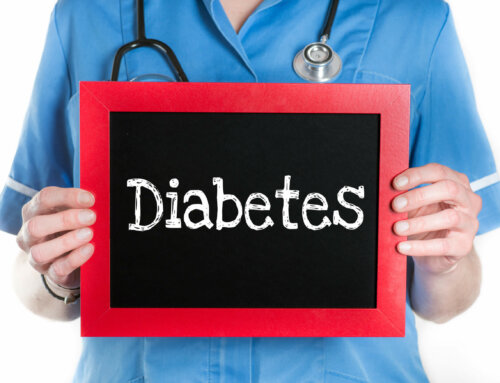National surveys estimate that 20 million women and 10 million men in the United States, will have an eating disorder at some point in their lives. Eating disorders have existed for many thousands of years. They can also affect every organ in your body and recognized as a medical disorder. The new thinking is, “eating disorders encompass biological, psychological, social, environmental and cultural aspects.” They have the highest mortality rates of all psychological disorders.
The largest incidence for eating disorders occurs during adolescence, but they can develop in children, middle age and older adults, at any time. Recent research reveals eating disorders are likely to be more common among women with diabetes than those who do not have it. Diabetes and eating disorders both involve attention to body, control of food and weight management. Learn more about binge eating, bulimia and anorexia with diabetes and what you can do about these conditions.
Binge Eating Disorder
Binge eating disorder or BED is a recognized eating disorder. It can prove life threatening if not dealt with. Binge eating does occur in men with diabetes but is more common in women with type 2 diabetes; 12% of people with type 2 diabetes have BED. People with BED are usually at normal weight or higher than average weight. Binge eating disorder is also called compulsive overeating. This occurs when a person has periods of impulsive, uncontrolled and continuous eating beyond the point of feeling full. After a binge, the person may feel self-hatred, pity or shame. Blood sugars will certainly be out of range after a binge.
Aspects of Binge Eating
- Feeling compelled to overeat.
- Feeling powerless to control over-eating.
- Has a psychological component.
- A physiological component- quick changes in blood sugars.
- Eating an excessive amount of food in a short period, compulsive snacking and meals.
- Feeling very uncomfortable from stomach fullness.
- Hoarding/stealing/collecting food.
- Eating alone due to embarrassment. Staying away from friends and activities.
People with type 2 diabetes are at increased risk for binge eating especially when certain food choices are made. Choosing quickly absorbed carbohydrate foods such as white bread, white pasta or white potatoes or other empty, sugary foods make blood sugars go up quickly. Without enough insulin, blood sugars can rocket and stay elevated which will lead to fatigue and a vicious cycle. Once insulin production catches up to get glucose into the cells, you may experience low blood sugar and the need to overeat again. People with type 1 diabetes have BED with higher blood sugars and more weight gain.
What Are the Most Common Psychological Reasons for Binge Eating Disorder?
- Depression- 50% of binge eaters show depressive behavior.
- Anxiety.
- Helplessness/loneliness/worthlessness.
- Unresolved stress.
- Guilt/boredom.
- Low self-esteem.
What Can Be Done If You Experience Binge Eating Disorder?
There are multiple things you can do to help yourself with binge eating disorder. There are many programs which focus entirely on eating disorders, whether you have diabetes or not. Eating disorders and diabetes both focus on body states, weight management and controlling food intake. As a result, some people develop a pattern and use diabetes to camouflage eating disorders. Healthy behavior is crucial because diabetes and eating disorders can lead to serious health complications. Help is available and recovery is possible. The first step is to recognize you have an eating disorder, like BED, and then consult with medical professionals and diabetes team to try to resolve it.
Things You Can Do to Take Control
- Consider psychotherapy to identify a stressful or negative event that may have led you here.
- Cognitive behavioral therapy – “ways and methods of thinking about eating” to help binging.
- SSRIs- anti-depressants prescribed by your physician to help boost your mood.
- Working on an eating plan with a qualified dietitian who specializes in eating disorders and has a strong knowledge of diabetes. Reviewing high quality carbohydrates, portion sizes, meal timing, meal planning, mindful techniques and tricks like cutlery /bowl/plate size.
- Avoid all sugary beverages.
- Avoid all processed and ultra-processed foods.
- Working with your health care provider to lower diabetes medications which cause low blood sugars like sulfonylureas and insulin. Avoiding low blood sugar swings may help reduce binge eating.
- Eat meals and snacks at regular times. Include all food groups including complex carbohydrates for fiber content. By doing so, you will not be hungry and less likely to binge.
- Learning to treat hypoglycemia or low blood sugar appropriately. Use glucose tablets or gel instead of candies/soda as they are easily overeaten and create a vicious cycle.
- Support groups which specialize in eating disorders may be extremely helpful for those who like social support.
It is important to share information with your health care team even though eating disorders tend to make you very private; do not be embarrassed. It will make it much more difficult for them to regulate blood sugars and your medication, if they do not know about your personal situation. Still never change medication without consulting your physician.
Anorexia Nervosa
Anorexia, formally referred to as anorexia nervosa, involves an obsessive fear of gaining weight. Focused on excessive weight loss and a cycle of self-starvation with denial of essential nutrients. Anorexia is an eating disorder with serious physical consequences. It is more common in females with type 1 diabetes and can be especially dangerous when you have type 1. Injecting insulin without eating can cause severe hypoglycemia. Not taking your insulin (for fear of weight gain) can be more dangerous.
A study of almost 17,000 cases of anorexia and 56,000 controls worldwide suggest, “metabolic factors may play a role in the development of the eating disorder.” Anorexia is an eating disorder causing people to, “obsess about their weight.” For years, anorexia was thought of a, “purely psychiatric disorder.” The study involved 100 worldwide academics with leads from UNC-Chapel Hill and University College of London, in England. There are currently 8 genetic variants presently being studied, that are chemical related and linked to anorexia. Some people with anorexia will monitor every drop of food, others purge by vomiting and still others use laxatives.
What About Anorexia?
- Mostly affects women-1-2%, men-.2-.4%
- Highest mortality rate of any psychiatric illness.
- Tendency to need complete “control of food” when other aspects of life are not in control.
- Death results from starvation, problems with electrolytes causing a lethal heart arrhythmia or suicide.
- Twin based heritability is high at 50-60%(genetics)
- Poor outcomes.
- More common in females with type 1 diabetes.
Recognize the Symptoms of Anorexia
- Extremely low body weight.
- Intense fear of being weighed by others.
- Constantly weighing themselves.
- Complaints of being tired, always cold, lethargic or possibly having too much energy.
- Distorted body image – seeing yourself as much larger.
- Avoids mealtimes. Deletes types of foods – especially carbohydrates, severely restricts calories. Develops food rituals – excessive chewing, eating food in a certain order, taking miniature bites.
- Extreme and excessive exercise regimens.
- Annoyed when being told to eat.
Anorexia was once thought of as only a “psychological problem.” The new message is, “There are genetic under pinning’s to anorexia.” Researchers state, “anorexia is a metabo-psychiatric disorder.” The metabolic factors involved in anorexia include blood sugars, lipids and anthropometric or body measurement traits. Not everyone with anorexia is razor thin or emaciated, so it may be challenging to diagnose. Although a serious and challenging condition, early recognition and intervention can lead to recovery, over a period.
Bulimia
Bulimia is also a life threatening, recognized eating disorder. It too, is more common in females with type 1 diabetes.
Bulimia involves ongoing binge eating, which is the fast consumption of large amounts of food. Purging occurs with laxatives or self-induced vomiting. Other factors are fasting and crash diets. People with bulimia practice vigorous exercise and may omit or reduce taking their insulin. People with diabetes should never adjust their medications, especially insulin, without the advice of their doctor. Excessive exercise, laxatives and other behaviors can cause dehydration, fluctuating blood sugar levels and additional complications with electrolytes.
Bulimia warning signs
- Going to the bathroom immediately and frequently after meals.
- Disappearing after most meals.
- Chewing gum and eating mints to dissipate the smell of vomit.
- Constantly rinsing with mouth wash for fresher breath after vomiting.
- Thinning and wearing off enamel on the teeth.
- Wearing baggy, ill-fitting clothing.
- Body weight going up and down, regularly.
Other eating disorders
Women with eating disorders may be underweight and face risks during pregnancy, such as delivering a baby with an abnormally low birth weight. Those who are overweight can develop gestational diabetes and deliver large babies. These babies may be at increased risk for future diabetes. Overweight women are also more prone to developing insulin resistance, type 2 diabetes, high blood pressure and heart disease.
Moreover, other complications of eating disorders include dehydration, acid reflux, Barrett’s esophagus (pre-cancer condition), gastroparesis (slow gastric emptying), esophageal tears and constipation. Also experienced are chemical imbalances and reduced calcium leading to teeth and bone disorders. Even brain changes can occur, mental concentration suffers, intense obsessive thoughts can arise, along with multiple sleep disturbances. With huge weight loss, there can be less sex hormone secretion and abnormal menstrual cycles for females. Furthermore, lack of nutrition can cause pulse and blood pressure changes along with symptoms of dizziness and fainting. Starvation may increase bad cholesterol levels and cause heart issues. These complications can exacerbate the symptoms of diabetes and lead to abnormally high or low blood sugar levels. Test your blood sugar levels regularly. Report any extreme highs or lows to your health care team, right away.
Bottom line
The combination of eating disorders and diabetes is dangerous and requires immediate medical attention. It will involve more than adjusting your food intake to be healthy and avoid improper eating patterns in the future. The recommendation is counseling along with cognitive-behavioral therapy. People must address the emotional, mental, and physical aspects of eating disorders. For example, portion control plates help people with eating disorders learn the proper amount of food to consume during meals. The process may take time and patience but can help you get past eating disorders and develop healthier habits for the rest of your life.
For some, eating disorders and diabetes seem to go together. Furthermore, it is important to seek immediate medical attention if you have an eating disorder to avoid serious health complications. Help is available and can significantly improve your life. Contact and get involved with the National Eating Disorder Association or NEDA, if you have an eating problem. Additionally, NEDA known as the largest non-profit organization dedicated to people with eating disorders. They offer helplines, screening tools, resources and suggestions for treatment options. They are up to date on the latest news about eating disorders and successful treatment places and plans. You can do this!













Leave A Comment